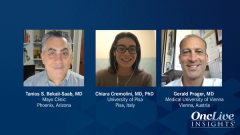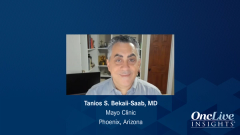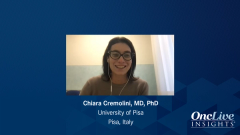
Role of Maintenance Therapy in Advanced CRC
Chiara Cremolini, MD, PhD; Gerald Prager, MD; and Tanios S. Bekaii-Saab, MD, share their approach to maintenance therapy, including with EGFR inhibitors, for the management of advanced CRC.
Episodes in this series

Tanios S. Bekaii-Saab, MD: Something that continues to come about, we discussed the triplet therapy, we even discussed EGFR inhibitors in certain cases. But the traditional wisdom of pushing aggressively and treat until progression is something that most of us don’t do anymore. We treat essentially to maintenance now, more than treat to progression. So how do you decide on maintenance, and more specifically to the discussion, with EGFR inhibitors. There are data, but those tend to be a little bit more challenging to maintain patients on. Maybe I’ll start with you, Chiara, and then Gerald. Thoughts about, who are those patients you pick for maintenance therapy vs a treatment holiday? Then, what do you do with the EGFR inhibitors?
Chiara Cremolini, MD, PhD: I generally treat the patients with the combination induction therapy for up to 4 months, more rarely up to 6 months. I think that the vast majority of the benefit from the combination treatment is achieved in the first 4 months, so 8 cycles of the weekly schedules of treatment. Then I generally go for maintenance therapy. I offer maintenance to my patients. I am quite a fan of maintenance, especially in combination with bevacizumab, when a bevacizumab-based regimen has been administered up front. This is because maintenance has clear evidence of being able to prolong the interim interval between the end of the induction therapy and the evidence of disease progression. Even if they wait, in terms of overall survival, the impact in terms of overall survival is not so clinically relevant. I think that having this free interval -interval free from combination chemotherapy is very important to preserve quality of life of the patients with less intensive, less toxic maintenance treatment, while reducing the chance of having disease progression. This makes it more feasible, both by a clinical and a molecular/biological point of view, for the reintroduction of the same agents used up front after the evidence of disease progression. In the case of adverse events, for example, hand-foot syndrome or neurotoxicity that prevents the continuation of the fluoropyrimidine, I generally go for a treatment holiday instead of continuing the bevacizumab alone. I think that the benefit from using the antiangiogenic agent alone in maintenance is pretty minimal.
With regard to anti-EGFR agents, we have now some more pieces of the puzzle. Probably the winner, again, is 5-FU [fluorouracil] plus anti-EGFR as the best maintenance option. This is more tricky to prolong the duration of the anti-EGFR treatment, especially for patients who suffer from a skin rash, which is actually the most relevant adverse event at this point. In the case of poor tolerance, I generally stop treatment and offer patients a treatment holiday. Overall, the benefit in terms of overall survival for maintenance is not so dramatic, and this is the reason why I think that this choice should be personalized. Also based on the patient’s expectations, the patient’s desire to have a break or not to have a break. I think this is something that, on a case-by-case basis, I generally discuss with each individual patient.
Tanios S. Bekaii-Saab, MD: Gerald, any thoughts? Especially focusing on the EGFR maintenance strategy, which I personally find very challenging.
Gerald Prager, MD: Absolutely. I would disagree a little for the first time with Chiara. There are data from trials we have seen this year. The PANAMA trial, the German trial being presented, with the same concept of deescalating the aggressiveness of the treatment in the RAS wild-type patient population, where you stop oxaliplatin and continue with anti-EGFR plus 5-FU vs 5-FU alone. By definition, the PANAMA trial was positive. But we have also learned that PFS2 [second progression-free survival], so time until second progression, was the same in both arms, and overall survival was also the same in both arms. No statistically significant difference. I think from the biological point of view, this makes sense. When we treat patients with anti-EGFR antibodies, we’re somehow selecting clones of resistance. If you’re continuing with anti-EGFR treatment, the option of reintroducing anti-EGFR upon first or later progression is probably less effective than if we would stop anti-EGFR treatment, and eventually upon progression restart, reintroduce anti-EGFR treatment. I think the PANAMA trial is a very good example. If you look into the detail, stop and go with the anti-EGFR antibody is an option, and sparing, probably, unnecessary skin toxicity. This might be, probably not from a medical point of view, harmful, but might be a burden for our patients.
Tanios S. Bekaii-Saab, MD: Thank you both.
Transcript Edited for Clarity







































